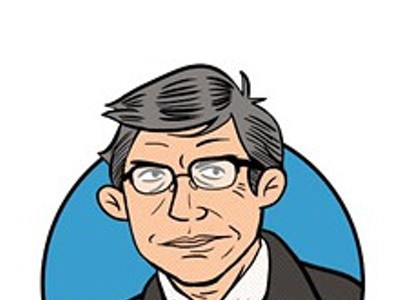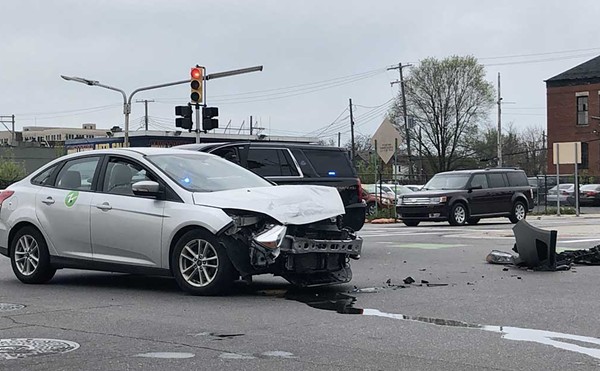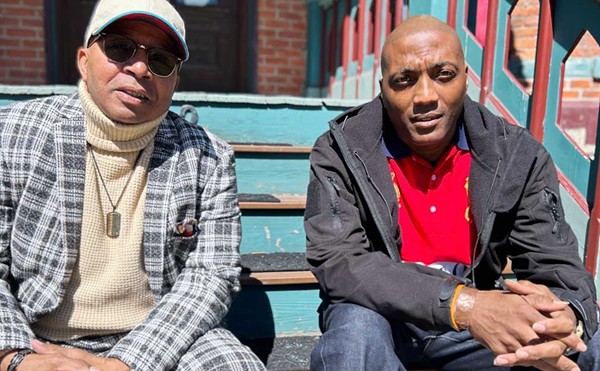Almost a decade ago, Rick Ector was considering buying a firearm for self-defense. And when he was robbed in the driveway of his home in Detroit's Rosedale Park, he wound up kicking himself for not doing so. He has since armed himself and become vocal about legal gun ownership, participating in gun-control debates in "Let It Rip" segments on FOX2 television, and founding his own group, Legally Armed in Detroit, through which he teaches classes about firearms. He says he doesn't necessarily identify with either major political party, and he skews libertarian. The main throughline in his politics is defending the right of people, especially African-Americans, to legally own firearms.
Metro Times: Your story and your work kind of challenge conventional wisdom. To state it bluntly, the conventional wisdom would be that African-Americans should be in favor of gun control because it makes them safer.
Rick Ector: Well, that's a really interesting argument, because there are tons of African-Americans, especially in the city of Detroit, who lawfully own guns, and who have jumped through all the hoops to get concealed pistol licenses. It's a fallacy. Many law-abiding African-American citizens own guns, and many every day are at the gun shops buying guns and becoming more educated. While we're talking about fallacies, there's another fallacy: that police have a legal obligation to ensure that you never become a victim of violent crime. The Supreme Court has ruled in numerous cases that if you were to call a local police agency for assistance and they fail to come in a timely fashion, there is no obligation to prevent you from becoming a victim. The job of the police is to support the general peace and order of the community. So I'm just a realist. I just realize that police can't be everywhere anytime something happens. Personally, I'm not making 911 my personal protection plan. If something happens, I will do whatever I can to protect myself, and if I have an opportunity to call for assistance from 911, I'll do that as well. But it's not my No. 1 game plan to stay safe. I have made it my personal business to make sure that I do everything that I personally can to make sure that I can protect myself and be as safe as I possibly can.
MT: What do you say to people who can't believe you are a gun-rights activist?
Ector: You know, I've had some interesting conversations. There are people who question my motivations, but it it's really simple. Once you've gotten to a place where you've embraced the utility of owning a firearm for personal protection, you start to become politically aware of individuals and organizations who are chipping away at your right to own and carry a gun, which really extends to your right to defend yourself, your right to defend your family. So, really, becoming politically active is really just an extension of gun ownership. Once you become a gun owner, you become aware of individuals who are trying to take away your right to own a gun. So actually I love to just flip that proposition altogether and ask, "Why are you trying to take away my right to own?" I always tell people, "If you want to debate the topic, I'll debate anybody, anywhere, any time on the subject." Let's actually talk some facts, let's leave the emotion out of the argument. Why is it that you want to take my gun away? I mean, if we outlawed all guns, which obviously would be illegal because it violates the Constitution and the Second Amendment, criminals and bad guys will still have guns. And so you could have a situation that could resemble what Chicago has been for many decades. You have a city of 2.8 million people, and it's illegal to own and carry a gun, but somehow 500-plus people manage to die from gunshots wounds in Chicago, so how in the world does that happen?
MT: You believe gun control has no effect on crime?
Ector: You know, I'm not going to say laws have zero impact, but they don't have as much impact on the behavior of criminals as a lot of people think they do. Just because something's illegal, you know, that will keep a law-abiding citizen from breaking that law, but if the person has criminal leanings or is inclined to commit criminal acts, the fact that it's against the law is just the cost of doing business, the consequences if they happen to get caught. And, you know, I look at statements that Detroit's police chief has made. To his credit, unlike other police chiefs we had in the past, he actually acknowledged that law-abiding citizens who have used their guns in self-defense actually had a positive impact on the amount of crime in the city. When you look at that spike in home invasions we had during, like, the first quarter of the year, it seemed like a few home invaders were shot, in many cases apprehended, and in some cases died. That sends a chilling message to people who would be so bold as to enter someone's home uninvited while the place is occupied. Once these home invaders start getting shot and in some cases killed, that's definitely going to impact home invasions, or the mindset of people, the way in which they commit crimes. Maybe they won't be so quick or so inclined to commit a home invasion.
MT: A lot of gun-rights advocates say, "Don't take away my guns." But gun-control advocates say, "We don't want to take away your guns, all we want to do is institute some common-sense measures to ensure that guns can be traced and registered." How do you respond to that?
Ector: Anytime someone says, "I'm not anti-gun, but ..." — you can just strike everything that occurs before the word "but" from the conversation. You know, there are over 20,000 gun laws in this country. There are people who are dedicated to creating more. We have all the laws with respect to guns and gun ownership that we need on the books. As a matter of fact, we have gone so far from "shall not infringe" I'm surprised that the Founding Fathers are not spinning in their graves right now. I was on "Let It Rip" maybe two months ago now, and I was debating this one state house rep and he kept saying things that were just simply not true. He kept saying that you could buy guns over the Internet without a background check. He kept saying it over and over and over again, and I'm telling you it's just simply not true. It makes you question the motivations of a lot of these anti-gun people. You know, either they don't know the law — which is a travesty if you're a person elected to create legislation — or you're just intentionally misleading people.
MT: They often say that you can go to a gun show and buy a gun without a background check.
Ector: There is no gun show loophole. Every particular dealer who sells at a gun show has an FFL, a Federal Firearms License from the Bureau of Alcohol, Tobacco, Firearms, and Explosions. What gun-control advocates are talking about, if they're being intellectually honest with you, is person-to-person sales, where you got a guy who legally owns a gun and you got a guy who legally can buy a gun, and they agree to sell the gun person to person. But they'll say, "No, no, no. That's not what we're talking about. What we're talking about is people who are selling guns at the gun show without a background check." And that's definitely not true.
MT: Should all handguns at least be registered?
Ector: I'll be the first to tell you that I am against handgun registration and I am against a handgun registry database. I don't think that having handguns registered buys you anything. I own a registered handgun, and let's say someone steals my gun. So I find out my gun is stolen, and I've got so many days of knowing it's stolen to report it. So what does it buy you to know that I originally owned that gun? Absolutely nothing. A person who eventually goes on to commit crimes with that gun is probably going to scratch off the serial numbers on that gun anyway. So now that gun can't physically be traced back to me anyway. OK, so now you got a person with an illegally modified gun committing crimes. So what if I originally owned it? What does that buy you? It buys you absolutely nothing. The whole point of handgun registration is to create a registry and a database of gun owners, and there's only one possible benefit that could become from a database of gun owners: It is to serve as a shopping list of where to go get those guns if they were ever criminally outlawed.
MT: We were talking about how gun buy-backs typically take place in predominantly black neighborhoods. Would you see gun laws as disproportionately affecting law-abiding African-Americans?
Ector: We could go all the way back to what happened in Michigan in the 1920s, and it relates to an important case in the city of Detroit in 1925. That's the Ossian Sweet case.
MT: Yeah that's right. A lot of younger people may not be familiar with Ossian Sweet. He was a black man defending himself in his home against a white mob, and he walked free after being acquitted by an all-white jury, thanks to defense attorney Clarence Darrow.
Ector: So as a result of that case, in 1927, two years later, the state of Michigan legislature created the most draconian set of gun laws they could come up with. They came up with handgun registration, as well as the creation of 83 county gun boards. And these 83 county gun boards would have the sole discretion to determine who could get concealed pistol licenses. We outlawed short-barrel rifles and short-barrel shotguns. Obviously if you want to take away some people's right to own a handgun, then obviously you want to outlaw modifying long guns so that they can be easily carried like a small handgun. So all of these laws were rooted in racism, because the idea that a black man could be acquitted of defending his home against a white racist mob of hundreds while the police were standing by down the street was unconscionable. This event could never happen again, so the state of Michigan legislature created these laws, and they were designed solely to take away access of handguns and firearms to black men. So, that's some of the history behind the gun control in the state of Michigan, and it's only been fairly recently that we've been able to get some of these Jim Crow laws off the books. We got shall-issue concealed pistol licensing in 2001. This is where we've abolished the discretionary process where each county gets to come up with its own particular criteria as to who can have a concealed pistol license. Under that discretionary system, we had a predictable result: People who lived in the suburbs could get guns and carry them, but people who lived in urban areas like Wayne County and specifically in the city of Detroit, we could not. And this existed from 1925 all the way until 2001. So you can imagine that's been quite a period of time in which, with politics and propaganda, you can turn the whole gun rights issue upside down. Gun control really is about race control and disarming black people.
MT: But don't you think that gun control laws are pushed by a lot of well-meaning, well-off Caucasian voters, voters who probably think it's going to help keep inner-city African-Americans safer?
Ector: There is this perception that, that gun owners are just old, middle-age, angry white guys. But gun ownership spans every spectrum. And what's really funny is that many anti-gun politicians are gun owners. So, even the anti-gun politicians aren't necessarily anti-gun; they're pro-gun for themselves. They're just elitists who are anti-gun for the masses. So, yeah, I challenge those individuals who have these characterizations of who gun owners are. We're everybody: black people, white people, Asian people, Latino people, male and female.— mt





